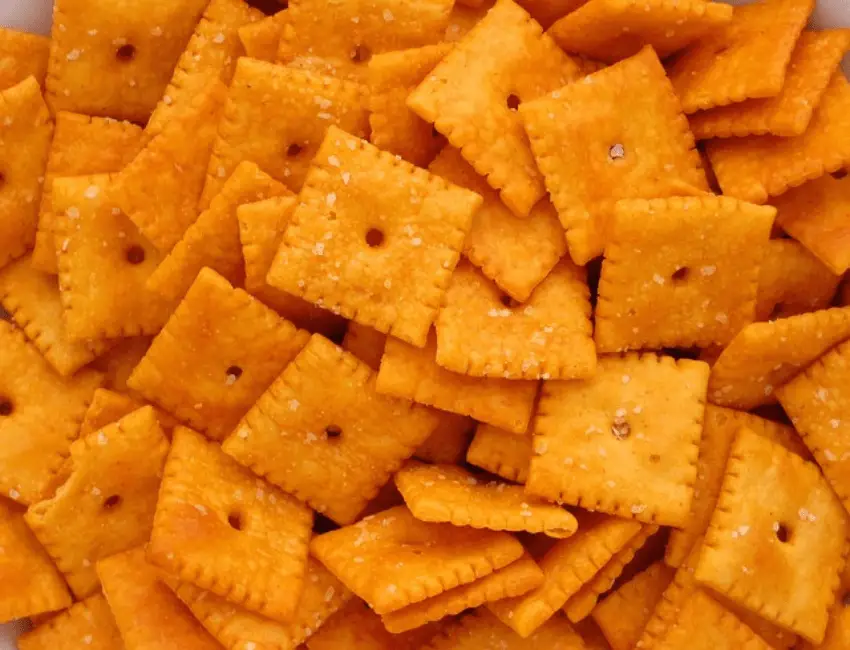Today you will learn whether Cheez-It crackers have added MSG. As a spoiler, some products have it while others do not. Let’s get into the information!
Cheez-Its & MSG
Added MSG appears as Monosodium Glutamate in the list of ingredients on the packaging if a product contains it. This is a requirement of the U.S. Food and Drug Administration (FDA) that U.S. food manufacturers must follow.
We studied the ingredients of each of the Cheez-Its listed below. We found that the majority of the crackers have added MSG. The table below clarifies which products have or don’t have added MSG.
| Flavor | MSG? (Yes or No) |
|---|---|
| Original | No |
| Extra Toasty | No |
| Extra Cheesy | Yes |
| Extra Big | No |
| White Cheddar | Yes |
| Pepper Jack | Yes |
| Cheddar Jack | Yes |
| Whole Grain | No |
| Italian Four Cheese | Yes |
| Cheese Pizza | Yes |
| Hot & Spicy | No |
| Reduced Fat | No |
| Buffalo Wing | Yes |
| Scooby-Doo | No |
| Puff’d Scorchin’ Hot Cheddar | Yes |
| Puff’d Double Cheese | Yes |
| Puff’d White Cheddar | Yes |
| Snap’d Double Cheese | Yes |
| Snap’d Cheddar Sour Cream & Onion | Yes |
| Snap’d Jalapeno Jack | Yes |
| Snap’d Parmesan Ranch | Yes |
| Snap’d Scorchin’ Hot Cheddar | Yes |
| Grooves Bold Cheddar | Yes |
| Grooves Sharp White Cheddar | Yes |
| Grooves Zesty Cheddar Ranch | Yes |
| Grooves Scorchin’ Hot Cheddar | Yes |
| Duoz Jalapeno & Cheddar Jack | Yes |
| Duoz Sharp Cheddar & Parmesan | Yes |
| Duoz Bacon & Cheddar | Yes |
| Snack Mix | Yes |
| Snack Mix Double Cheese | Yes |
Note that the table above reflects only whether Monosodium Glutamate is added to a given product. Keep in mind that MSG occurs naturally in several foods but there is no requirement to list natural MSG in the ingredients. For example, yeast extract, Parmesan cheese, tomatoes, and soy sauce all naturally have glutamate and are simply listed by their common names when used as ingredients.
Why Do Cheez-Its Have MSG?
MSG is often added to snack foods like Cheez-Its and Chex Mix for flavoring. It provides a savory taste that is known as umami. Umami is one of the five tastes alongside salty, sweet, sour, and bitter. In addition to flavoring, MSG can help reduce the need for sodium by assisting in bringing out natural flavors from food.
Is MSG Safe?
MSG has been used for over 100 years since it was invented by a Japanese chemist in the early 1900s. It has been classified as “Generally Recognized As Safe” by the FDA since 1958. After decades of extensive studies, the evidence so far suggests that MSG is safe to consume by the general population.
Be aware that there may be some people who are sensitive to MSG, especially when consumed in larger quantities. People who are purportedly sensitive to MSG have reported generally mild symptoms such as numbness, flushing, nausea, and headaches after eating MSG.
If you suspect that MSG is causing you health issues, stop eating foods containing it and seek guidance from a qualified health care professional if needed.
Sources:
cheezit.com
Glutamate and Monosodium Glutamate: Examining the Myths . https://foodinsight.org/wp-content/uploads/2009/10/Glutamate-and-Monosodium-Glutamate.pdf.


